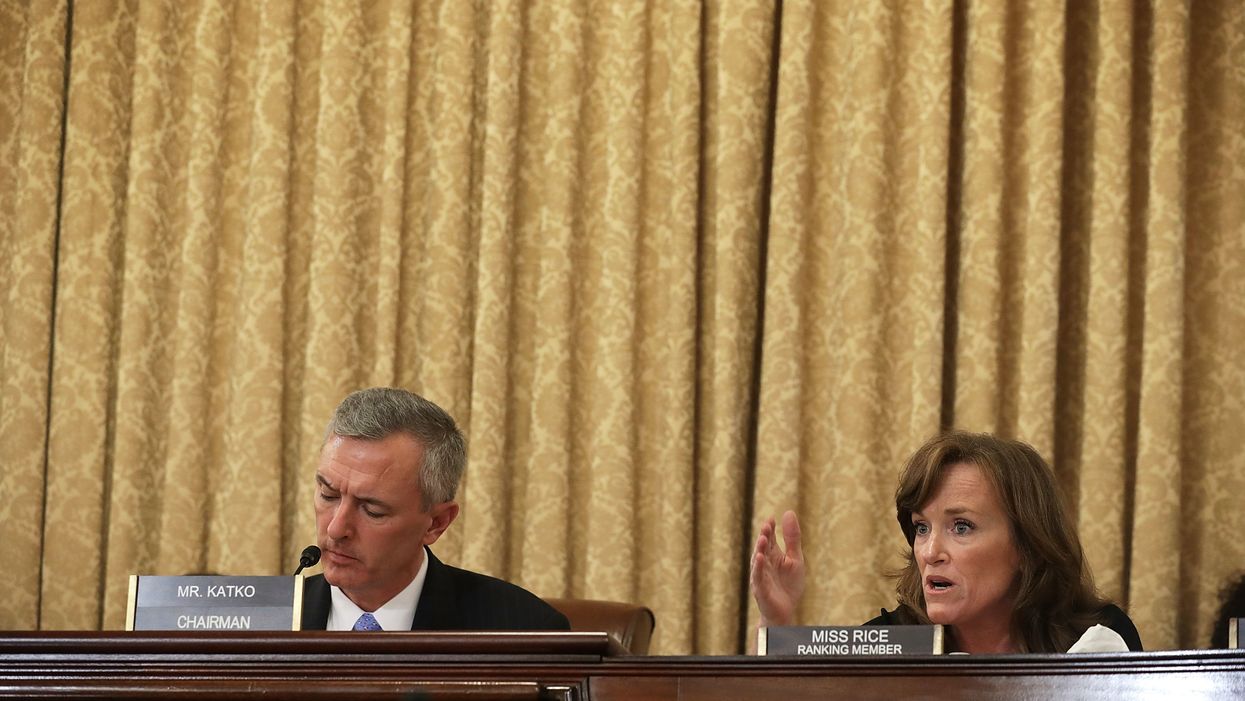Wass is board chairman of American Promise, which seeks to limit the power of corporate, union, political party and super PAC money in politics.
While it has garnered widespread support among Americans across the political spectrum for years, the movement for a 28th Amendment to the Constitution to end the domination of big money in our political system now is gaining significant traction in Washington. Thus far 11 current and former 2020 presidential candidates have signed the American Promise Pledge to support a constitutional amendment to get big money out of politics, and measures proposing such an amendment have 180 co-sponsors between the House and Senate.
However, only one of those 180 co-sponsors is a Republican: Rep. John Katko from New York's 24th District. The currently lopsided support for this effort highlights how destructive partisan politics can block individuals from acting on their private convictions.
The idea of limiting big money in politics is actually a bedrock conservative principle, supported by a significant majority of conservative voters. "Draining the swamp" was among the driving forces that led to President Trump's election. "Cronyism" has been a concern of conservative voters for decades, and Milton Friedman himself sounded the alarm over a system where businesses compete by seeking government favors. And many former Republican elected officials publicly support a 28th Amendment.
We can only imagine many sitting Republicans in Congress agree, but are hesitant to make that support public in the current contentious environment. Here are three reasons why Republican elected officials should set the record straight and reclaim leadership of the principles they have been committed to for so long.
1. Perceived corruption is undermining free-market capitalism
In a recent op-ed for The Hill, Republican former state Sen. Jim Rubens of New Hampshire writes about the reasons the dominance of big money in politics leads to less freedom in the free market: "Business competes by buying influence or submitting to extortion in Washington, rather than by offering better products and services to consumers. Free markets are becoming crony capitalism."
Surveys show growing numbers are losing faith in free market capitalism and representative democracy. In 2015, the Committee for Economic Development, a nonpartisan, business-led public policy organization, released the report "Crony Capitalism," which concluded: "The remarkable success of capitalism in the United States has been made possible by widespread public support for that system. Sadly, in recent years, and especially since the September 2008 financial crisis, that support has seriously eroded. Increasingly the public is coming to view the system as unfairly benefitting the few and as favoring Wall Street over Main Street."
This is true especially among younger Americans and non-white Americans, both of whom will soon be majority voting blocks. Today 61 percent of Americans age 18-24 have a positive view of socialism, according to a recent Harris Poll.
Left unchecked, the report says, crony capitalism will continue to undermine public support for the American model of capitalism — and sap vitality from the economy. "This adds urgency to the task of finding solutions to the rise of crony capitalism."
2. Political money is undermining economic dynamism and innovation
The United States has seen a long-term decline in business startups and a growth in the economic power of entrenched companies according to The Hamilton Project's team. According to a report from the Economic Innovation Group, which tracks America's economic vibrancy, "The entrepreneurial and restless energy that once defined the United States seems to be evaporating as the economy grows more static, top-heavy, and concentrated. The decline of dynamism has been steep, rapid, and pervasive across all states."
The influx of money into our political system resulting from shifts in the law and Supreme Court decisions has led to skyrocketing election spending, and with it an escalating dependence on fundraising in Washington. This means the biggest players in the economy can increasingly shape the rules to their own benefit — leading to a top-heavy system designed to benefit entrenched players at the expense of competitors. The CED report describes "three interconnected trends responsible for distorting our economic system: a rise in the size and scope of government, campaign costs and lobbying."
3. The big money system is tipping to favor Democrats
Despite the critical importance of the previous two points, a cynic may argue that being better at playing the big money system gives Republicans the electoral edge. But that argument falters as Democrats begin to overtake Republicans in the big money spending race.
In 2018, liberal dark money groups outspent conservatives, and out-of-state liberal dark money groups have swayed recent state political contests, including Alabama's special Senate election. The pay-to-play political system is a costly arms race without a positive end for anyone but powerful special interests, who are successfully gaining outsize influence while undermining capitalism and democracy.
As recently affirmed by the Business Roundtable, our country has achieved two centuries of economic and political dominance based in large part on its belief in two revolutionary systems: the free-market economy and representative democracy. These systems have paved the way for our nation to improve the lives of its millions of citizens.
Today, faith in these systems has been shattered by the Supreme Court-sanctioned domination of wealth and concentrated power over our political system. Now is the time for political leaders of every ideological persuasion to align with the people and address the greatest danger threatening the very heart of our great nation: a pay-to-play political system that is rapidly transforming our republic into an oligarchy.



















Trump & Hegseth gave Mark Kelly a huge 2028 gift